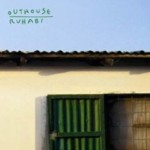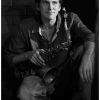Home » Jazz Articles » Album Review » Outhouse: Ruhabi
Outhouse: Ruhabi
The drummers play the traditional music of the Wolof people, which Outhouse drummer Dave Smith fell in love with back in 2002, when he was studying music and culture in The Gambia. Following several more solo trips by Smith, Outhouse spent a month in the country in 2007, absorbing Wolof music and playing with local musicians. In 2008 and 2009, the band brought the drummers to Britain for a series of performances and recording sessions. The association is as deep as it is lengthy, and light years away from the hit-and-run projects which have turned the word "fusion" into something resembling a curse.
Wolof music is centered on drums and percussion, and is rich in complex cross-rhythms even by African standards. It is heard throughout The Gambia and neighboring Senegal, and is the tradition Senegalese singer Youssou N'Dour drew from so tellingly when he created the mbalax style in the 1980s. The tama is the lead instrument in much Wolof drum music, its rapid fire beats and pitch modulations played over an evolving tapestry of rhythms played on the sabars. The music has a wild, raw edge but is highly sophisticated and precisely codified. (The short video clip below captures the edge; the drumming, however, isn't as layered or complex as that heard on Ruhabi).
To this rich tradition, the four members of Outhouse graft their own spacey style of modern jazz. Tenor saxophonists Robin Fincker and Mark Hanslip alternate between improvisation and pre-composed passages, some perfectly in unison with the sabars' intricate beats, others more elliptical. Smith and bassist Johnny Brierley work closely with the sabar drummers, and Brierley's motifs and ostinatos also reflect the pitch variations of the tama. The result is edge-of-the-seat thrilling, and the new version of "Japa Seloho," the tune featuring Secka on Outhouse, shows how close this collaboration has grown. Long may it continue to thrive.
Outhouse has also released a mini-album, Ruhabi Live (Loop, 2010), recorded at London's Café Oto in autumn 2009. By this time Hanslip had been replaced by Tom Challenger, and a tougher twin-tenor sound introduced, on this recording anyway. It too is highly recommended.
Track Listing
Mam Bamba; Duck Dance (Leumbeul); Njawara (Ndaga); One Pot (Shebugen); Bara Mbaye; Rass; Song For Ibu (Lamba); Japa Seloho (Kanara); Ruhabi (Kaolack); Closing Baka.
Personnel
Robin Fincker: tenor saxophone; Mark Hanslip: tenor saxophone; Johnny Brierley: double bass; Dave Smith: drums; Baboucar Camara: nder, tama; Biran Siane: tambart, tama; Kaw Secka: tungene, chole, tama; Mam Biran Saine: tungene, chole; Laity Fye: mbonbong bala, vocals.
Album information
Title: Ruhabi | Year Released: 2010 | Record Label: Loop Records
< Previous
Man of the Light
Comments
Tags
For the Love of Jazz
 All About Jazz has been a pillar of jazz since 1995, championing it as an art form and, more importantly, supporting the musicians who create it. Our enduring commitment has made "AAJ" one of the most culturally important websites of its kind, read by hundreds of thousands of fans, musicians and industry figures every month.
All About Jazz has been a pillar of jazz since 1995, championing it as an art form and, more importantly, supporting the musicians who create it. Our enduring commitment has made "AAJ" one of the most culturally important websites of its kind, read by hundreds of thousands of fans, musicians and industry figures every month.




















